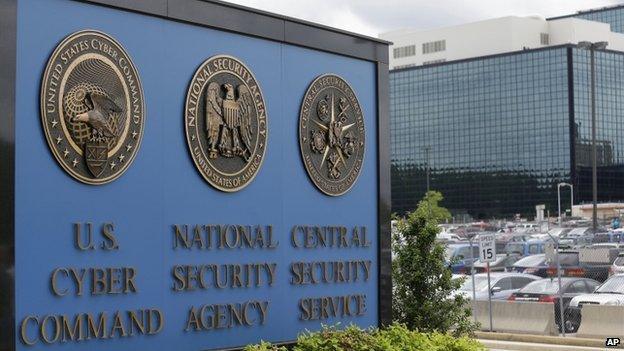Obama 'considering end of NSA phone data collection'
- Published

The NSA collected and stored almost 200 million text messages daily across the globe, the Guardian reports
President Barack Obama plans to ask Congress to end bulk collection of US phone records by the National Security Agency (NSA), senior officials say.
They told the New York Times, external the agency would "end its systematic collection of data about Americans' calling habits".
Phone records would instead remain with telecoms companies, only to be accessed by government when needed.
It follows widespread anger at home and abroad after leaks revealed the full extent of US surveillance operations.
The documents - leaked by former NSA contractor Edward Snowden - revealed that the US collects massive amounts of electronic data from communications of private individuals around the world, and has spied on foreign leaders.
March deadline
In a speech in January, President Obama said it was necessary for the US to continue collecting large amounts of data, but that civil liberties must be respected.
He said the current system, in which the NSA collects the details of the times, numbers and durations of phone calls, known as metadata, would come to an end.
According to the New York Times report, he told the US justice department and intelligence officials to come up with a plan by 28 March.
Under the new proposal, officials say surveillance "would require phone companies to swiftly provide records in a technologically compatible data format, including making available, on a continuing basis, data about any new calls placed or received after the order is received".

Ex-NSA contractor Edward Snowden leaked information revealing the full extent of US surveillance operations
The phone companies would not be required to hold on to the data for longer than they normally would, the New York Times says.
The NSA currently holds information for five years, whereas telecoms companies are required by federal regulation to retain customer records for 18 months.
The new proposal "would retain a judicial role in determining whether the standard of suspicion was met for a particular phone number before the NSA could obtain associated records", the newspaper adds.
The Obama administration plans to renew the current NSA programme for at least another 90 days until Congress passes the new legislation.
New legislation has also been developed separately by leaders of the House intelligence committee that would allow the NSA to issue subpoenas for specific phone records without prior judicial approval, the New York Times reports.
The New York Times report does not provide information on possible changes to the NSA's surveillance of phone records from other countries.
In January, President Obama offered assurances to non-Americans, saying people around the world "should know that the United States is not spying on ordinary people who don't threaten our national security".
It was revealed last year that the US had spied on friendly foreign leaders, including on the personal mobile of German Chancellor Angela Merkel.
But President Obama has defended the use of data, saying it had protected against terrorist attacks at home and abroad, and insisted nothing he had seen indicated US intelligence operations had sought to break the law.
Edward Snowden, who was behind the leaked the information, is wanted in the US for espionage and is now living in exile in Russia.
Civil liberties groups see him as a hero for exposing what they see as official intrusions into private lives, but many Americans believe he has endangered American lives.